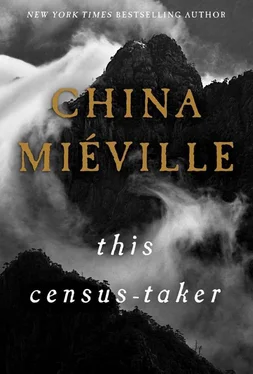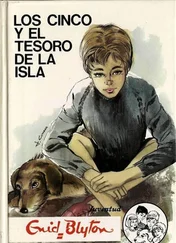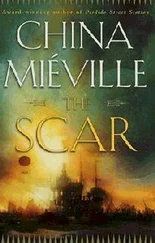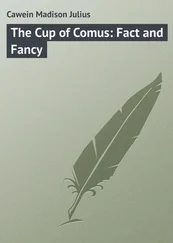“A woman brought it,” I said. He picked it up and turned it over. “She threw it away and went.”
“Whatever this came from,” he said, “what she wants is a key to make it start again.”
“Can’t she just put it back in?” I said.
Outside the goats howled. My father’s eyes flicked momentarily in their direction.
“She might,” he said. “She wants a key to help her. I could make her a key from this.”
I watched him sort his awls and files, his flat metal and vise.
He went down to town again, not many days later, taking the remains, and soon such a trip was nothing to remark on, and sometimes more people came up, as the woman had, while he was gone. And I’d tell them when to return. I couldn’t leave, still, and I knew it, though not quite why. I could only go so far down.
—
One evening I found only one goat, though I’d tethered the two together, as was usual. I knew them apart: it was the more adventurous and argumentative which was gone. I could have told you what her name was at that time.
I picked up her chain. At its end was her leather collar. It had been cut through.
Her comrade seemed untroubled. She rushed up to me in case I’d brought anything new or unusual to eat from the cupboard, as I was not supposed to do but occasionally did. She eyed and shoved me.
I whispered, “Where’s your sister?”
Of course I thought my father had taken her but even then in the waning light, my throat stopped up with fear for the animal, it didn’t feel as if he would have done this. I couldn’t imagine him taking a knife to leather that way, not with his face as I’d seen it.
Still I could barely speak as I returned to the house. I told him. His reaction both reassured and terrified me. His fury made me certain he wasn’t responsible; it made me even more afraid because he was furious, though not with me.
He slammed his hand repeatedly on the table and I made myself as still and small as possible while he raged at thieves. For the only time I remember he shifted briefly to his first language, in which I now write, which then I didn’t know at all. He cursed and glared.
I saw him swallow and keep his voice quiet when he spoke to me directly.
With no gun he took some bladed tools from his workroom and went striding out into the twilight. A strong wind had come up and it shoved dust into the room before I got the door closed. I watched him through the window, flashlight in one hand, some nasty spike in the other, hauling over the rocks in the face of all the blown grit in the world, baying his ugly gibberish language into the hill.
I closed my eyes and imagined my house without him, without me, now that my mother was gone. Empty again, the house would grow more and more sensitive to weather, in the absence of noise, of human noise. My house had always known what the weather would do.
After I don’t know how long, while I stood ready for something, I heard a single cracking shot, not far from the house.
Many possibilities occurred to me, with emotions for which I have no name. But my father returned shortly after that, still scowling, and the darkness became complete.
“It’s gone,” he said. “I didn’t find it. You heard. Whoever took it is gone, and eating chevon tonight.”
He went to cut metal.
Long after midnight, with the grinding of his work still audible through his closed door, I came down and set out alone into the black toward the bridgetown for a third and last time.
I knew I wouldn’t reach it. I didn’t expect to be gone far or long. This time I didn’t even put on extra clothes, though I knew how cold it was. And though my face burned with it, and though my breath was fog, I felt almost too hot, or not too hot but too something, as if there was no boundary between the air and me. I was dissolving, both sweaty and shivering. I went without hesitation. I could see enough of the path to descend.
There’d been so many of these descents; there are so many ways to go down a hill. I remembered the last but one time, when I ran alone, a weeping mess with death behind me. That earlier me was a stranger child for whom I had care and with whom my patience was strained.
I froze. And after an instant a jackal yelled, as if it had been waiting for me to stand still. It was close. I tried to understand why I’d stopped.
A coil of mist moved in front of me. I tried to think about why I didn’t continue down. I raised a foot experimentally and put it back again, slowly, just where it had been.
The mist beckoned me and pushed me back at the same time. It thickened and seemed to fill with watchers, or with a single fleeting man. I couldn’t continue.
Is it his keys? I thought in the rising wind. My legs trembled.
It’s his keys, I thought. Had my father cut a key to hold me?
I saw deeper shadow in that cloud and felt cold because there was certainly someone there, someone looming out of it, carrying a burden. I was sure it was whomever I’d seen, or thought I had, the night I’d last taken the path. I heard footsteps and quick animal breathing and the jackal howled again.
The mist seemed to move aside and be replaced and who came wasn’t the dim watcher I remembered but someone smaller, a woman shape or a girl shape. She raised an arm.
Here was Samma.
I gasped and put up my hands and cried out a wordless greeting like an animal, and the animal watching us whimpered.
Samma carrying a bag on her shoulder come up so high, come out of the town I’d come to understand she would or could not leave, standing on the hill path ready for me, knowing I’d be there.
She looked taller and underfed and much older to me. She looked drawn so far from the bridge. But she smiled, and it was not too wary, and she waved me down to where she waited.
I thought of the jackal slinking away from our reunion. But I still couldn’t move my feet further down the hill, so I raised my arms and, deciding she could overcome herself, beckoned her urgently in turn to come up a little more.
—
Another twenty steps for her and she struggled as if there wasn’t enough air.
I whispered, “See?”
When she reached me, first she shook my hand as if we were adults, and I liked that. Then she hugged me in a rough way, hesitated and did it again, so hard I let out sounds.
“You’re here!” I said into her clothes. “How did you know to find me?”
“I heard something,” she said. Her voice was sluggish. “There was a shot. Right near here. I thought that might mean something. I got thinking you might come down.”
She was lying. She must have been here when the shot came to know it had been close, which meant she’d been there a long time. I suspected then that she’d been up night after night, as far as, according to the constraints she’d laid, she was able, to wait and hope to find me. I’d come at last.
She shivered on the rocks and spread a blanket on the dirt for us and sat me down beside her. She had food for me. Sugary brittle. Vegetables you could eat raw. I gnawed them.
Eventually I said, “That boy said Drobe was gone.”
We stopped eating. She didn’t look stricken. She didn’t look anything except calm and unhappy. “People go,” she said.
“Why did he go?” I said. “He’d never just go .”
“I don’t know, ” she said. “He didn’t come by you? I thought he’d come for you. What if he did, though? Maybe he tried.”
I heard sniffing: our hungry watcher had come back with a companion, it sounded like. We weren’t frightened.
“You know,” Samma said. “Maybe he did. Maybe he just went.”
Boys and girls might become more solitary thieves. They might find a way or a person with whom to become some sort of adult. They might antagonize the wrong someone and disappear.
Читать дальше












